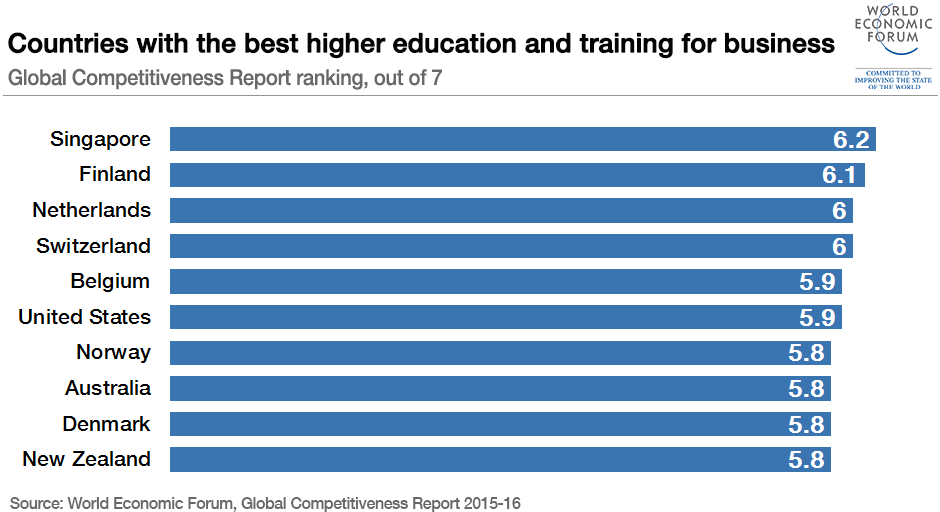Is education the secret of Singapore’s success?
Stay up to date:
Infrastructure
This article is published in collaboration with Project Syndicate.
Lee Kuan Yew’s achievements have been the subject of much global discussion since his death. But one aspect of his success has been little mentioned: the investments that he, and his successors, made in education. His strategy, he would often remark, was “to develop Singapore’s only available natural resource, its people.”
Today, Singapore routinely ranks among the top performers in educational attainment, as measured by the OECD’s Program for International Student Assessment (PISA).
What did Lee Kuan Yew and Singapore do right?
For starters, it should be emphasized that Singapore’s education system was not designed de novo by Lee Kuan Yew and his colleagues. Rather, it was built on the very solid foundations inherited from Singapore’s British colonial past. In contrast to many of his contemporaries among post-colonial leaders, Lee Kuan Yew was not afraid to embrace whatever elements from that past that would prove useful to the nation-building enterprise.
Nowhere is this approach more evident than in education. Many of the country’s premier educational institutions – for example, the National University of Singapore (founded in1905), Raffles Institution (founded in 1823), and the Anglo-Chinese School (founded in 1886) – significantly predate independence in 1963. Moreover, the curriculum for secondary education is modeled on the British O level and A level qualifications (with some adaptation to account for the generally higher average attainment levels of students in Singapore). And, though infrastructure is by no means neglected, the primary focus of educational investment is students and teachers.
A national system of generous scholarships enables the best students to avail themselves of an education at some of the world’s premier universities, even as Singapore develops its own world-class institutions. Moreover, with starting salaries above the national median, the teaching profession attracts, develops, and retains some of the best graduates.
Moreover, Singapore’s education system is unabashedly meritocratic (some might say elitist) in its focus on identifying and developing the very best talent and, equally important, directing it toward public service. Government scholarship recipients are obliged to serve in the public sector for a minimum of two years for every one year of study.
The same meritocratic approach governs the development and promotion of teachers. Top-performing teachers are given leadership responsibilities without excessive regard to tenure, and there is a revolving door between the education ministry, classrooms, and school administration. Educators are frequently seconded to carry out policy work. Many subsequently choose to return to the classroom.
The elitist tendency in Singapore’s education system is tempered by the fact that quality education is available for all levels of academic aptitude. Singapore is rightly proud of its elite secondary and tertiary academic institutions, but one could argue that the hidden gems of the system are the hundreds of neighborhood schools, institutes for technical education, and polytechnics that provide high-quality education for all.
Singapore’s education system is relentlessly forward-looking. From adopting bilingualism with English (in addition to the mother tongue of Mandarin, Malay, or Tamil), to its focus on science, technology, engineering, and mathematics (STEM), Singapore anticipated many of the key education strategies being adopted by today’s policymakers.
The choice of English was driven by history and a multiethnic society’s need for a common language. But it was also a prescient recognition of English’s rapid emergence as the lingua franca of global commerce and science, and that once entrenched it was likely to remain so for decades, if not centuries, to come. In this regard, too, Lee Kuan Yew distinguished himself from other post-colonial leaders of his generation. Rather than pandering to narrow nationalist sentiment and opting for the majority language and culture, he and his colleagues chose to adopt a global language for a global city.
Finally, Singapore’s education system evolves with the times and in light of new evidence. In the 1990s, Singapore’s policymakers, concerned that their approach to education might be somewhat regimented and overly focused on STEM, began to provide avenues for excellence in the humanities, arts, and sport. That rebalancing is still ongoing, with a new emphasis on identifying ways to foster creativity and entrepreneurship.
For Singapore’s founding father, education went beyond formal schooling. As he put it in a speech in 1977: “My definition of an educated man is a man who never stops learning and wants to learn.”
Indeed, Singapore’s world-class education system will be one of Lee Kuan Yew’s most enduring legacies. It was fitting that his state funeral took place at the National University of Singapore.
Publication does not imply endorsement of views by the World Economic Forum.
To keep up with Agenda subscribe to our weekly newsletter.
Author: Stavros N. Yiannouka, former Executive Vice-Dean of the Lee Kuan Yew School of Public Policy at the National University of Singapore, is Chief Executive Officer of the World Innovation Summit for Education (WISE), an initiative of the Qatar Foundation.
Don't miss any update on this topic
Create a free account and access your personalized content collection with our latest publications and analyses.
License and Republishing
World Economic Forum articles may be republished in accordance with the Creative Commons Attribution-NonCommercial-NoDerivatives 4.0 International Public License, and in accordance with our Terms of Use.
The views expressed in this article are those of the author alone and not the World Economic Forum.
Related topics:
Forum Stories newsletter
Bringing you weekly curated insights and analysis on the global issues that matter.
More on Education and SkillsSee all
Anurag Sinha
May 9, 2025
Navi Radjou
May 8, 2025
Rachmat Pambudy
May 1, 2025
Shuvasish Sharma and Ximena Játiva
May 1, 2025
Ricky Li and Ximena Játiva
May 1, 2025







